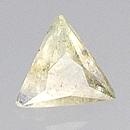|
Click on a letter above to view the list of gems. |
|
|
|
|
|
|
|
|
Wardite |
|
| | |
| Discovered in 1896; IMA status: Valid (pre-IMA; Grandfathered). | ||
|
| ||
|
Chemistry |
| ||||||||||||||||||||||||||||||
|
| |||||||||||||||||||||||||||||||
|
NaAl3(PO4)2(OH)4·2(H2O) | |||||||||||||||||||||||||||||||
|
|
Hydrated Sodium Aluminum Phosphate Hydroxide | ||||||||||||||||||||||||||||||
|
Molecular Weight: |
397.94 gm | ||||||||||||||||||||||||||||||
|
Composition: |
| ||||||||||||||||||||||||||||||
|
|
|||||||||||||||||||||||||||||||
|
|
|||||||||||||||||||||||||||||||
|
|
|||||||||||||||||||||||||||||||
|
|
|
Classification |
|
|
| |
|
Phosphates | |
|
7/D.51-10 | |
|
|
8 : PHOSPHATES, ARSENATES, VANADATES |
|
Related to: |
Wardite Group. Wardite - Millisite Series. |
|
Synonyms: |
Soumansite |
|
|
|
|
Crystal Data |
|
|
|
|
|
Crystals dipyramidal, pseudo-octahedral, exhibiting forms {010}, {011}, {012}, {100}, and rarely {001}. Commonly striated perpendicular to [001]. Granular aggregates and crusts; subparallel aggregates of coarse fibers; radially-fibrous and concentrically banded spherulites. |
|
|
None |
|
|
|
|
|
Physical Properties |
|
|
|
|
|
[001] Perfect |
|
|
Brittle |
|
|
5.0 |
|
|
2.81 - 2.87 (g/cm3) |
|
|
None |
|
|
Not Radioactive |
|
|
Other: |
Completely soluble in acids with difficulty. |
|
|
|
|
Optical Properties |
|
|
|
|
|
White, Colorless, pale Green, Blue-Green, Yellow-Green, pale Yellow, Brown; Colorless in transmitted light |
|
|
Transparent to Translucent |
|
|
Vitreous |
|
|
1.586 - 1.604 Uniaxial ( + ) |
|
|
0.0090 - 0.0100 |
|
|
None |
|
|
|
|
|
Occurances |
|
|
|
|
|
Geological Setting: |
A component of low-temperature phosphatic nodules; an uncommon species in complex zoned pegmatites. |
|
Common Associations: |
Crandallite, Millisite, Variscite (Little Green Monster mine, Utah, USA); Eosphorite, Fairfieldite, Ferrisicklerite, Hydroxyl-Herderite, Mitridatite, Montgomeryite, Roscherite, Siderite, Whitlockite (pegmatites). |
|
Type Locality: |
Clay Canyon, Fairfield, Oquirrh Mts, Utah Co., Utah, USA |
|
Year Discovered: |
1896 |
|
View mineral photos: | |
|
|
|
|
More Information |
|
|
|
|
|
| |
|
|
|
|
There
a several localities for finding Wardite but only a
few that could produce gem quality crystals. These include
the Feldspar quarry, Wolfsberg Mt., Spittal, Millstatt lake ridge, Carinthia, Austria;
Ilha claim (Lavra da Ilha), Taquaral, Itinga, Jequitinhonha valley, Minas Gerais, Southeast Region, Brazil;
Rapid Creek, Dawson Mining District, Yukon Territory, Canada;
the Little Green Monster mine, Clay Canyon, about nine
km west of Fairfield, Utah County, Utah, USA; Palermo No. 1 Mine (Palermo #1 pegmatite), Groton, Grafton County, New Hampshire, USA. |
|
|
We
have not photographed our Wardite gems. Please
check back soon. |
